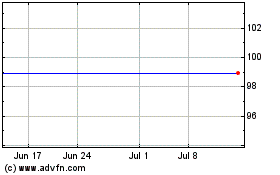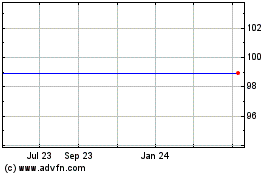Warner Bros. in Talks to Make Movies in China
August 25 2015 - 12:30AM
Dow Jones News
By Ben Fritz and Shalini Ramachandran
Rather than wait for China to open its doors to Hollywood,
Warner Bros. is making a big play to take up residency in
China.
The Time Warner Inc.-owned studio is in talks with China Media
Capital, a state-backed investment fund focused on the
entertainment industry, to form a joint venture that would produce
local-language films, people with knowledge of the potential
partnership said.
The expected pact is a show of faith that the world's
fastest-growing major film market will continue to devour motion
pictures, even as Wall Street sweats about growth prospects for the
overall Chinese economy.
Hollywood studios have worked with partners in China to produce
movies there in the past, usually on a one-off basis. The Warner
deal, which is intended to make numerous films annually, appears to
be the largest and most expansive of its kind.
It wasn't immediately clear how many movies the joint venture
would produce or how much money each partner would invest. It's
also possible that the recent financial turmoil in the country
could make closing the deal more challenging.
Despite China's recent economic slowdown, the Chinese box office
continues to expand at a rapid clip and local productions are
taking a bigger share.
While total box office in China is up 43% so far in 2015 to $4.3
billion, ticket sales for Chinese productions are far outpacing
those for movies coming out of Hollywood. Local-language movie
grosses have risen 63% to $2.6 billion and imported movies are up
21% to $1.7 billion, according to research firm Artisan
Gateway.
Among the top 10 movies in China so far this year, only four are
Hollywood imports. The locally made "Monster Hunt" has grossed
$346.2 million and is poised to surpass "Furious 7," which grossed
$379.1 million, as the most successful movie ever in the
country.
That trend, combined with China's import quota, makes a
partnership to produce locally critical for any American film
company looking to make more money in the country. The Chinese
government allows only 34 movies to be imported per year on a
revenue-sharing basis-- the only terms that major Hollywood studios
will accept. The deal governing that quota runs until 2017.
Films made locally also qualify to keep a significantly higher
percentage of box-office revenue than imported ones, which are
capped at 25%.
Time Warner invested $50 million into China Media Capital two
years ago, a partnership that led to the current discussions by
Warner Bros. Chief Executive Kevin Tsujihara's team. The
negotiations have been going on for many months, said a person with
knowledge of the matter, due to the complications of forging deals
and getting government approvals in China.
China Media Capital also invested in a joint venture through
which DreamWorks Animation SKG Inc. is producing movies in
Shanghai, including the coming "Kung Fu Panda 3."
Legendary Pictures LLC recently wrapped production on "The Great
Wall" starring Matt Damon, the first movie under a partnership it
formed with state-backed China Film Co.
Both of those deals are intended to make movies primarily in
English for global audiences, in contrast to the arrangement Warner
Bros. is pursuing.
As with most joint ventures Western companies enter in China,
including Walt Disney Co.'s theme park under construction in
Shanghai, Warner Bros. would be a minority shareholder. However,
its executives are expected to play important roles in getting film
production off the ground, bringing their expertise as China seeks
to build its culture industry.
At a Time Warner investor day presentation last year, Mr.
Tsujihara said expanding local-language production in China would
be a priority for his film and television studio, known for the
Batman and Harry Potter franchises as well as "The Big Bang
Theory."
Write to Ben Fritz at ben.fritz@wsj.com and Shalini Ramachandran
at shalini.ramachandran@wsj.com
Subscribe to WSJ: http://online.wsj.com?mod=djnwires
(END) Dow Jones Newswires
August 25, 2015 00:15 ET (04:15 GMT)
Copyright (c) 2015 Dow Jones & Company, Inc.
Time Warner (NYSE:TWX)
Historical Stock Chart
From Mar 2024 to Apr 2024

Time Warner (NYSE:TWX)
Historical Stock Chart
From Apr 2023 to Apr 2024
